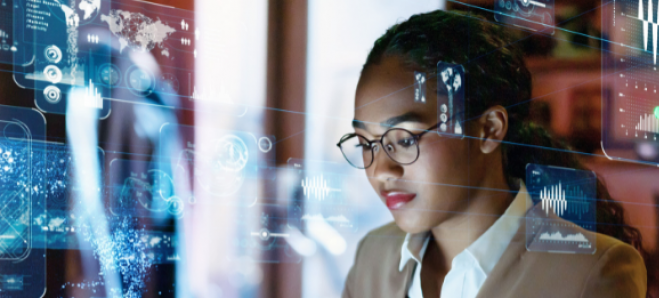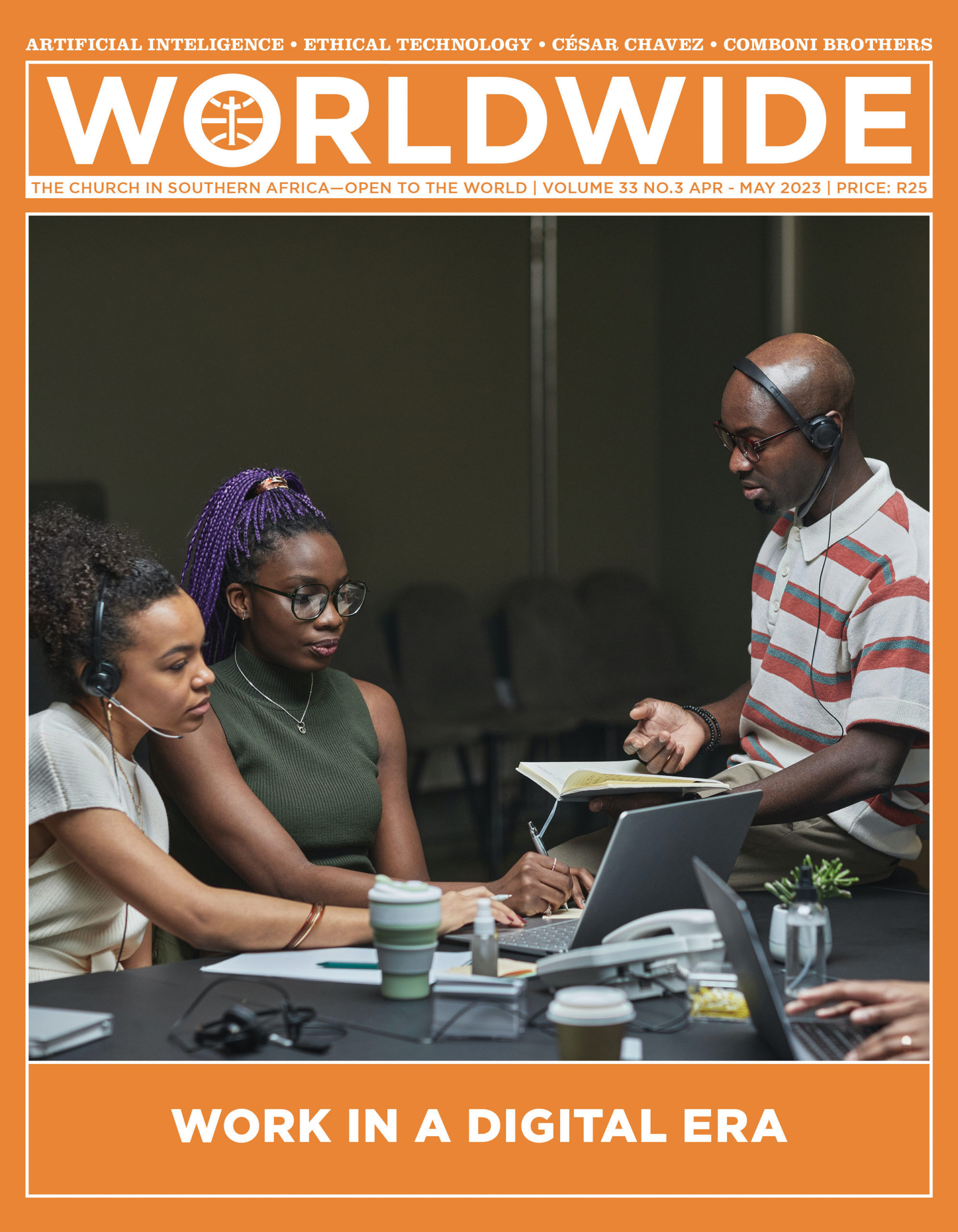
WORK IN A DIGITAL ERA
In the image we see a group of work colleagues discussing and planning their activities. They seem to have fun and an amicable relationship. The future of work passes through team work and co-operation in a spirit of mutual collaboration.
SPECIAL REPORT • DIGITAL ERA
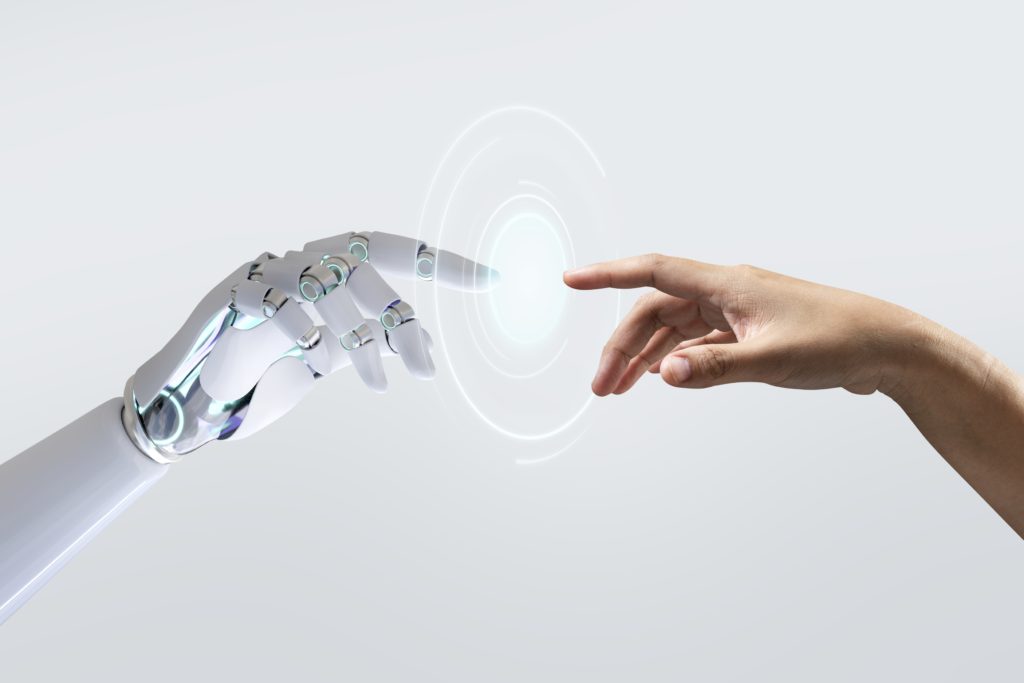
TECHNOLOGICAL SKILLS FOR TODAY’S LABOUR MARKET
More and more necessary in the working world, new technological knowledge and skills need to go hand in hand with human aptitudes such as solidarity, common sense, creativity and communication
BY
JESÚS VARGAS
| IT BUSINESS MANAGER, MADRID
ALEJANDRO DE CELIS | CYBER-SECURITY SENIOR MANAGER, JOHANNESBURG
TODAY’S LABOUR market barely resembles the one our parents knew.
The digitalization of everyday life has favoured a drastic and almost
instantaneous assimilation of advances. Common routines such as the printing and delivery of Curriculum Vitae (CV) tend to disappear for the vast majority of sectors and associated jobs, giving way to job portals. Who has not prepared a CV in a well-known word processor, generated a PDF document and sent it via e-mail?
What not so long ago was associated with specific professional profiles has nowadays been incorporated into what is recommended and, in many cases, necessary: technological skills. From the businessman’s perspective, technological changes increase the productivity and competitiveness of businesses, as one can optimize resources and contemplate new work models that were previously unthinkable due to the limitations of technology.
Knowledge and skills vary depending on the position, sector and speciality but, in general, it is expected that a young person in 2023, regardless of their geographic location, will be able to make use of a computer or similar, with all that it offers at the end-user level, and be able to interact with others, utilizing powered telecommunication tools, well known by many as a result of COVID-19 and the resultant instant change into a teleworking model.
ChatGPT
At the end of November 2022, the world discovered a technological tool destined to change the global labour market forever. The Internet, social networks and the press began to fill with news about ChatGPT, a Chatbot (conversational robot) that works with Artificial Intelligence (AI) and is capable of answering any type of question with a logical meaning and formulating human conversation following the storyline. In less than two months since its launch, ChatGPT has broken the record in the growth of registered users in consumer applications or apps, with 100 million users. To give us an idea of the magnitude of the implications, this tool could have written this article without the reader realizing it because AI is called to imitate human intelligence in its entire splendour, with all that this entails, on an ethical, human, social and labour level.
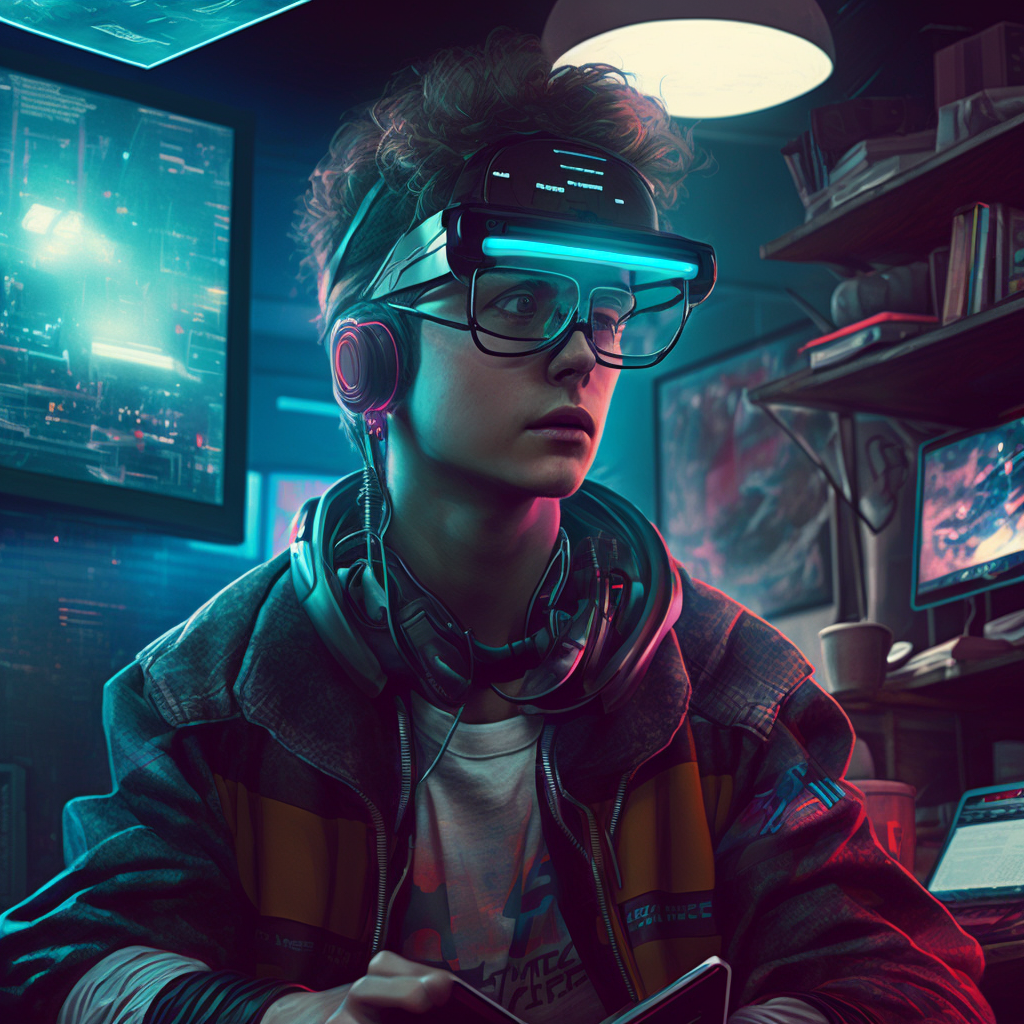
Telework and new technologies
Everything is changing very fast; the Covid-19 pandemic altered the way we work in many ways. Overnight, companies and workers had to change their work strategies and routines due to the confinements. Employees began to set up home offices without understanding the impact this would have on professional relationships and on their lives. The digital transformation or integration of digital operations in our daily lives became unavoidable.
Since then, the technology sector has grown exponentially. We began to hear terms such as crypto-currencies or digital currencies, Blockchain and Metaverse (virtual world), which caused waves of hiring in the labour market in which many companies such as Facebook, Google and Amazon launched a search for professionals with the best skills. It was the beginning of the race in developing the technologies of the future and no company wanted to be left behind.
So, what are the technological skills that companies are looking for, and
how can young people prepare themselves to enter a constantly changing labour market?
To understand the current labour market, we must distinguish between
generic digital users or those who have had to adapt to the digital market, and native digital users, who were born into a digitized ecosystem.
Generic and native digital users
Digital users had to adapt to a labour market in which computers and the Internet appeared, changing the way of working that existed until the end of the 20th century. Nowadays, any employee who requires a digital device to perform his/her professional activity must, at least, know and use Information Technology (IT) tools such as a digital device, whether a desktop computer, laptop, smartphone or tablet and know its basic operation. To know how to make use of Word processors, spreadsheets and presentation programs; digital document processors; electronic messaging tools; communication tools, video calling and instant messaging, exponentially boosted during and after the pandemic; Internet research tools; social networks; and to know how to creat a professional profile are also important skills.
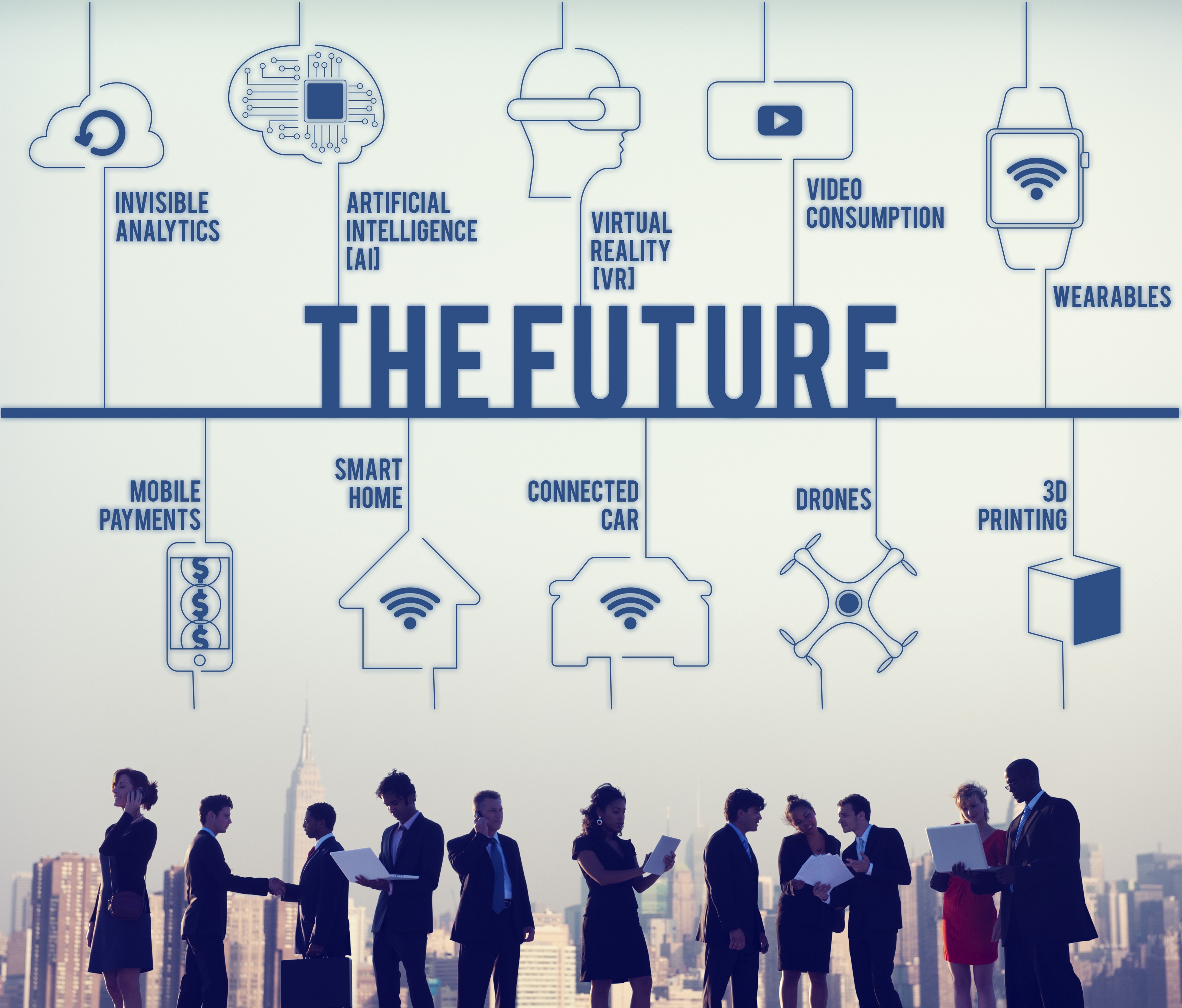
In addition, we can see that a digital user needs a certain level of awareness of cyber-security. This field has ceased to be solely and exclusively for IT technicians to whom one turns when something does not work as it should. Regardless of the investment made, without proper training and awareness of their staff, organizations will continue to assume too high a risk. Knowing how to differentiate legitimate emails from potential fraud, understanding why security measures, both physical and logical, are in place in each organization and the consequences of bad practice, in many cases accidental, are the basis of cyber-security training.
Coding or computer programming
Everything seems to indicate that the world will be governed intellectually by those who know how to program, develop and understand code. Even more importance will be given to those who know how to explain simply what they want to create. Low-code platforms are designed for those who, without having computer skills, want to create, develop and maintain applications on the most varied devices and digital media, in the most efficient way possible—automatically.
Data analytics
In the 1990s, industrial companies dominated the world. With the advent of the internet and then smartphones, data became the new king. Young people need to learn to analyse and understand data with a view to working with large blocks of information and create meaningful reports and graphs which provide value.

Data can be used to drive economic growth and improve people’s quality of life, but it must also be managed responsibly to avoid misuse. Ethics, therefore, goes hand in hand with this new technological age and professionals are needed who, in addition to their analytical talent, bring rigour and common sense to this new era of misinformation.
Cyber-security
This field has acquired great importance and relevance in recent years as a result of the globalization of cybercrime. It would be extensive to detail all the technological knowledge that today’s cyber-security requires, but it is worth noting that it is no longer only the IT field that requires it.
The digital era and hyper-connectivity have given rise to the Internet of Things (IoT). Likewise, Operational Technology (OT) environments have joined digitization and remote connection. All this has contributed to the expansion of the technological knowledge and skills which cyber-security workers must possess to perform their job.
Artificial Intelligence (AI)
ChatGPT is just the beginning of the AI era. It has taken the entire spotlight but in the shadows, applications with AI functionalities are being born which are flooding the internet and are coming to make our lives easier; or to replace us? As in every era, technological advances have destroyed jobs but also created new ones. The way these applications operate, give us clues that, as we said with programming, those who know how to understand and in this case manage AI in a simple way, will have great power, which also comes with great responsibility.

Skills in augmented reality
In 2018, the movie Ready player one, a science fiction film directed by Steven Spielberg, was released. The plot focuses on a virtual reality game called OASIS, in which users can interact in that world and compete for a cash prize and the inheritance of its creator.
How do we interact or become part of this virtual world? Augmented Reality (AR) plays a fundamental role, as it is used by the characters to interact with the virtual world of OASIS and see and experience virtual elements in the real world, which allows for a very realistic game experience.
Putting on AR glasses and immersing ourselves in a video game as if it were real life is a given. For this, skills such as knowledge of hardware, 3D design and user experience are essential, along with creativity and communication skills to generate immersive experiences close to reality.
Social media and digital marketing skills
Are we becoming asocial, or is the way we communicate changing? The reality is that human beings are social beings. The way we communicate is changing and with it our habits, the way we consume and the ways we relate to each other. Social networks are no longer so social. We no longer follow what our friends do. We see and consume what others do, who with a lot of creativity and innovative communication, turn products or services into viral social movements.

Social networks are therefore now entertainment networks. Some such as Tik-Tok, Instagram and Facebook currently stand out for the promotion of products and services, which go viral as their photos or videos have more views. This change of concept has led to an increase in the use of digital marketing—a set of strategies and techniques of promotion, advertising and online communication— another very important skill needed in today’s working world.
Product design and user experience skills
It is increasingly normal to see children handling smartphones better than middle-aged people. They are the socalled ‘generation Z’, those born from the year 2000 onwards who have grown up in 100% digital environments. This generation is used to this kind of environment, and skills such as digital product design and user experience are intuitive for them and at the same time fundamental.
Prototyping, user interface design, usability evaluation and continuous iteration to improve user experience are now highly demanded skills and tools such as Adobe Creative Suite, Sketch, Figma and InVision help to obtain such knowledge and skills intuitively and simply.
As we can imagine, going deeper into each of the topics discussed here would be enough for a monothematic article on the subject. However, the current technological era requires a minimum of knowledge to belong to it, regardless of the person’s age.
Skills such as solidarity, common sense, creativity
and communication are aptitudes that stand out in a great professional person
The new generations are adapted to the changes and make use of digital technology practically from birth, continuing in their daily lives as they grow up. In parallel, an additional effort is required from the older generations who, for many of them, have been overtaken by the digital revolution, creating a new type of illiterate person—the digitally illiterate.
Therefore, there is currently a digital divide at the demographic level in which young people have and will have an advantage as digital natives, but it should be noted that there is also a global divide in which many countries are ahead at the technological level, creating economic and social inequality.
Technological skills are and will be fundamental in any society to reduce
this gap and to enter the labour market, but human skills are the ones which prevail in the face of changing trends and revolutions. Skills such as solidarity, common sense, creativity and communication are aptitudes that stand out in a great professional person, and as a society, we must work to make them relevant when it comes to directing technological advances along the right path of history.


